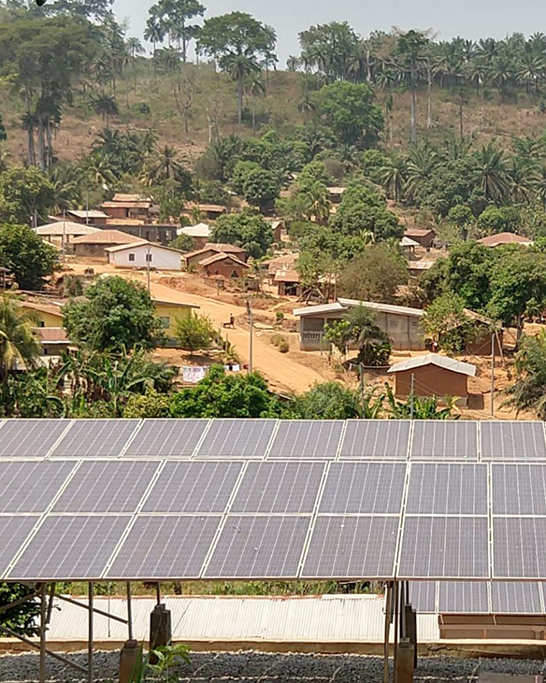
Climate Proof
Mini Grids
Ghana Mini-Grid Project Component
Ghana has made significant progress in expanding electricity access, with a national electrification rate of over 85% as of 2023 . However, many rural and remote communities still lack reliable power due to the high cost of extending the national grid. Mini-grids, which are localized, independent power systems, offer a sustainable solution by harnessing renewable energy sources such as solar photovoltaic (PV), wind, hydro, and biomass. These mini-networks offer a reliable source of electricity to areas that seem impossible to access national grid power supply. It typically consists of:
- • Power generation Sub-system (solar PV or hybrid systems with battery storage)
- • Distribution Sub-system (Low Voltage Distribution Network)
- • End-user Sub-system (Smart Metering & Management System)
- • Mini-grid Monitoring System
The Ghana Mini-Grid Project

Mini-grids are particularly useful in off-grid and underserved areas, providing clean, reliable, and affordable electricity. The Ghana Scaling-Up Renewable Energy Program (SREP) mini grid project involves the development of 35 mini grids climate proofed for an installed capacity of 4.525 MWp consisting of 11 units of 50 kWp, 11 units of 75 kWp and 13 units of 120 kWp in island/lakeside communities along the Volta Lake. The project consists of the design, engineering, supply, construction, installation, testing and commissioning of renewable energy systems on the island/lakeside communities along the Volta Lake. Direct beneficiaries of the project include 47 island/lake side communities across 9 island districts through mini grids. The project is being financed by African Development Fund (ADF), Climate Investment Fund (CIF) and Government counterpart funding.
The 35 mini-grids development will benefit about 47 island/lakeside communities which have been demarcated in the following Lots:
- LOT 1: Lala, Tomefa, Ogetse, Mogyaduro, Willikope, Klokope, Ketiase, Otukope, Okplama, Sakepti, Tordzikope, Abugame located within Sene East District in Bono East region.
- LOT 2: Nigeria Camp, BBC, Adidodeke, Congo, Kafaba Devaglo, Kulor, Mataheko located within Central and East Gonja Districts in Savannah region.
- LOT 3: Dzatake, Old Otisu, Tokpo, Tokpenja No. 2, Jerusalem, Galikope, Gbodigi, Sikape, Kissikope located within Krachi West and Krachi East Districts in Oti region.
- LOT 4: Torkpenya, Chakaye, Hodzikope, Koblavi, JJ Kope, Blugu, Fanteakura, Akpolikope located within Sene East District in Bono East region.
- LOT 5: Adakope, Ningokope, Batorkope, Accra Town, Chripo Ayimeye, Dzatakpo, Domeabra located within Pru East District in Bono East region.
- LOT 6: Vomekope, Adakuji, Dasikope, Teacherkope located within Kpandai District in Oti region.
The deployment of the 35 mini-grids in these island and lakeside communities along the Volta Lake offers numerous benefits that extend beyond mere access to electricity. These benefits contribute to sustainable development, improved quality of life, and economic empowerment.



